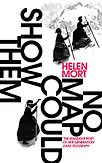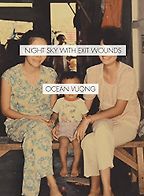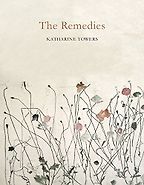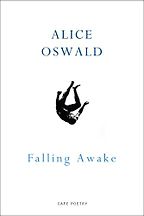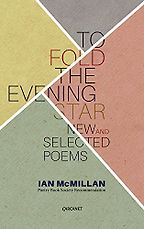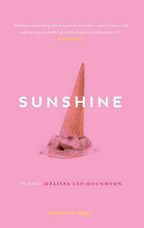Did you find that your choices came to mind immediately? I guess another way of putting that question is: was 2016 a good year for poetry?
Some of them came instantly to mind – like Ocean Vuong’s book, that was just one of the most memorable collections I read this year. Another one I’ve just been reading this week, so it’s a latecomer to my list. But I do think this has been a really good year for poetry – there are lots of exciting books just out as well. I’ve just got a copy of the lyrics of Johnny Cash, edited by Paul Muldoon, and there’s Jacob Polley’s new book – so it does feel like a really rich year for poetry. There are lots of others that I could’ve picked – the Forward Prize and the T. S. Eliot Prize both had really strong shortlists, and they reflect the strength of the past 12 months.
What do you hope to find in a collection?
The best thing I can compare it to is how I saw that film Paterson, about the bus driver/poet. It’s amazing and I’ve been saying to everyone since I saw it that it felt like a film I wanted to live in forever – I just wanted to continue to live in that film. And if a poetry collection makes me feel like I’d like to live in it in some way – even if it’s not a “nice world”, if it’s not a pleasant world that it evokes – if it makes me want to inhabit it and stay there for weeks, that’s my mark of a collection that I’ll go back to. It’s something that I think is genuinely exciting. I did want to live in all of these books.
It’s interesting that you say that because the world that Ocean Vuong creates in your first choice, Night Sky with Exit Wounds, is a really difficult one – it’s a very violent collection.
Yes, it’s really unsettling and revelatory and strange and brilliant. I think the way it juxtaposes violence with the everyday is powerful. There’s a poem in the book where Vuong juxtaposes scenes from the 1975 fall of Saigon with lines from the famous Bing Crosby song, “White Christmas” – quite seasonal right now, actually – and I find there’s more violence in that than just writing about violence. That’s what’s so remarkable: the way that chaos and normality are interposed. I really like the way he writes about the body as well – again, it’s quite violent – but I had this strange experience: I read this collection in a tent on a glacier in Greenland; I was on a mountaineering trip. It was one of the only things that I took with me to read and so I was reading it underneath the Northern Lights and the strange colours of the sky, like something lit – an almost broken and beautiful sky. So I was reading this collection, and the violence but the beauty of it – it was one of the most powerful reading experiences I’ve ever had. And the setting was part of that – books are always things that you can’t separate from the places that you read them in.
I’m glad you mentioned that poem – “Aubade With Burning City” – about the fall of Saigon and “White Christmas”; it reminded me a bit of one of your own poems, “Scab”, from Division Street (2013), where you give a version of the Christmas carol “We Three Kings”: “Star of Orgreave, star of light, star / of fucking royal shite. Westward leading, / kids want feeding, guide us to your / perfect light”.
I hadn’t thought of that, but, yes, I think that is the kind of thing that appeals to me – it’s everyday life. It’s Auden, isn’t it? That idea that suffering happens while the horse is getting on with its life, and there are people in other corners of the painting that don’t know that it’s going on. That idea is something I’ve always been really drawn to; it really gets me, that notion that suffering is also ordinary. And Vuong’s language is just extraordinary – it seems to fizz. There are some beautiful images – really visual images. In one poem there’s something about a piano in a field and it just stuck in my head – it’s such a strong visual motif. I’d never read any of his work before and it was very exciting – I will now, of course. I’d say this was my book of the year. It was such a revelation.
Vuong is a double outsider, in a sense – as an immigrant (he moved from Vietnam to America when he was two years old) and a gay man in a conservative context. He describes himself as a “beast banished / from the ark”.
And the way he writes about fathers is really brilliant and unsettling as well – there’s that everyday violence of judgement, small acts that reminded me of Claudia Rankine’s Citizen where she talks about “micro-aggressions.” That’s another book in recent years that’s had quite an impact on me.
Tell me about your next book, Katharine Towers’s The Remedies.
I used to live in the same village as Kathy Towers and there’s a sense of shared landscape. I’m aware that I’ve been trying to write inspired by some of the same landscapes as her – that bit of the Hope Valley in the Peak District – and for somebody to make a familiar landscape strange to you is a really powerful thing. She’s got a real precision to her work; they’re really haunting poems that take the pastoral and subvert it. I was most drawn to the title sequence, “The Remedies,” where there’s this idea that she’s decided to make flowers that are traditional cures for things suffer from the malady that they’re supposed to correct – what a great way of making something fresh, of making us look at something differently. They’re really melancholy, beautiful poems. Again, I’d just returned from Greenland when I read this and I was particularly drawn to the way she writes about ice. There’s a beautiful poem about icebergs that are almost like a bridal procession, and I thought that was just such an achievement. Having spent a lot of the summer myself trying to write about these awe-inspiring icy landscapes and trying to find an appropriate language of awe, to read somebody else’s way of evoking ice was really wonderful.
Get the weekly Five Books newsletter
It’s a really tight collection, isn’t it? And much of it is rooted in the natural world – as you said, ice and flowers, but also birds. There’s a poem about a chaffinch, and one called “Murmuration,” about starlings. There’s a line in that one, I think, where she says: “none of this is about us.” In another she says, “We should not be looking so hard // at what a tree would rather keep to itself” – we’re outsiders here, aren’t we, pesky intruders?
That’s something I’ve often felt in similar landscapes. I was thinking about the murmurations that I’ve tried to write about, and aspects particularly of the Hope Valley, and the more you try to write about, to inhabit a landscape, the more it makes you feel strange in your own skin – almost as if you don’t have the right to belong to it somehow. These are such pared-back, elegant and wistful poems.
Her language is very precise – every word is just… nailed.
They feel like they’re poems that are really achieved, that they’ve been redrafted and redrafted and worked at, and I admire that sense of craft and whittling something down to what you really want to say.
Alice Oswald’s collection, Falling Awake, is similar in that respect – and, in fact, we get more starlings, more murmurations, in her collection: “I can only see you through starlings / whom you try this way and that like an uncomfortable coat / and then abandon”. It feels like she’s really testing the extent to which nature can accommodate human expression.
There are similar themes and landscapes to Towers’s, but Oswald is a much more expansive writer; she’s got a kind of searching, questing way of writing about dawn, rain, rivers, the underground; I felt like they were prayers in some way, or vigils – acts of vigil – especially her long poem about dawn. I read somewhere that she got up every day to see the dawn for months and you really get that sense of careful, paying attention – there’s a tenacity and commitment to detail in her work. I love all of Alice Oswald’s collections – you always know you’re going to get a great sequence of poems from her but I thought this one was a real tour de force. It’s a vivid and exciting book. I remember hearing the poem “Dunt” years ago, I saw her read it aloud, and so I could imagine her reading the new collection – there’s a real fidelity to voice and the breath in her work.
It’s such a powerful thing when a poem carries the natural rhythm of the poet’s speech in it, and you know that the poet and the poem are, in a way, one and the same.
Absolutely, and it goes back to this artificial divide between so-called performance and page-poetry. I think of someone like Alice Oswald as a real performance poet, actually, because when you hear her read, the breaths and the pauses, the hearing it in her voice, are so crucial. And I think these are poems that deserve to be heard aloud as well as read on the page, quietly to yourself. There’s a real quietness to them, too.
A few people have mentioned Falling Awake as their book of the year – and not just in the poetry category. Craig Raine pointed out how Oswald’s poems cross borders; another reviewer emphasized how “she finds words for encounters with nature that ordinarily defy language.”
There’s a poem early on about badgers that is extraordinary in that way – you really feel like you’re in an underground world. And when she writes about rain you feel as though you’re somehow a part of the fall of the rain but you’re still with it as it seeps into the ground. She’s very good at taking the reader on a journey and seeing it through to its conclusion.
There’s a line in “A Rushed Account of the Dew” which seems to sum up something that’s important to the collection: “I want to work out what it’s like to descend /out of the dawn’s mind // and find a leaf and fasten the known to the unknown”. To fasten the known to the unknown is a lovely expression, and it’s something you’ve written about, too, the difficulty of finding a way to grasp the unknown – you described it on your blog as “a preoccupation with inarticulacy, especially when faced with certain landscapes.
When you read Alice Oswald – and I’m sure this is her achievement – you never feel as though she is ever lost for ways to approach landscape. Which is comforting – it makes me excited about trying to do that myself.
As we might expect from an Oswald collection, mythology plays a significant role.
I read this around the same time that I was reading her Memorial: An excavation of the ‘Iliad’ (2011), and I kept thinking about how deftly she does that, how she connects these very… delicate, almost – delicate but tough – ways of describing landscape, always with a sense of myth and excitement, I suppose. It’s that idea that stories are inherent in landscape and that landscape has a memory that’s much longer than ours. It was interesting to read those two alongside each other.
Let’s move on to Ian McMillan’s To Fold the Evening Star. This one is a little different in that the other books are new collections in their entirety, whereas this is a mixture of new and old poems, drawn from eight previous collections.
I chose this one because McMillan has been a really big influence on me as a poet – he’s one of the first poets that I started to read when I started to write my own stuff as a teenage, and I think having all his work brought together like this really brings home the seriousness of his particular brand of surrealism. People don’t often pay attention that side of his work. Especially in some of the early poems and collections – like his “The er Barnsley Seascapes” and his poem “Pit Closure as Art” – he has this amazing capacity to use the surreal or black humour to explore themes, particularly of industrial decline and political conflicts. I was very drawn to those poems because they had a landscape or a context that were familiar to me. I think the juxtapositions in his work are really significant – I don’t know anyone else who writes about, say, pit closure, in quite that way. Having a range of his work brought together like this [collection does], really does bring that home. And also, just to see the achievement of his writing life – what an eclectic writer he is. So prolific, too – I mean, what a commitment to poetry; it’s very inspiring.
McMillan is all but inseparable from the north of England, but, as such, is also a perfect example of how localness isn’t limiting.
Exactly – that to be local isn’t to be parochial. That’s one of the things I’ve always taken from McMillan; he made me feel like it was OK to write about Chesterfield and Sheffield and to focus on street names. It makes me think of that nice quote from Patrick Kavanagh where he said – and I’m paraphrasing – that to know fully even one field or one gap in a fence is a lifetime’s work.
I’m sure that’s a part of what Sue Arnold was getting at when she wrote in the Guardian that, “If they made [McMillan] Poet Laureate on Friday, a lot more people would be reading poetry by Monday.” He’s democratic in the truest sense of the word – with none of the dumbing-down that people half expect to go with that term.
Definitely, and he’s just such a great public figure in the poetry world – he’s a great advocate for poetry, and sometimes people seem to forget about the quality of his own work. That’s one of the reasons I was so drawn to this book – I really enjoyed re-reading it and recapturing that feeling of being a teenager encountering some of those poems for the first time.
He has such an appealing optimism. In an interview recently, in The London Magazine, he was at pains to point out that we’re in “a good time for poetry at the moment” – which is something I don’t feel we hear enough about.
Even individual poems are full of optimism, even when they’re dealing with landscape and loss – he’s very good at showing rather than telling, but there’s still a sense of hopefulness. I love the way he writes about train journeys and the community aspect of that – what it means for us to travel together.
The politics are essential. You’ve said that you “can’t help but be political . . . we see things in brighter colours up where we live” – i.e. northern England. Your first collection, Division Street, seems a case in point. It’s been a big year for politics – to put it mildly. Do you expect to become more overtly political in the coming years? The most difficult thing, I imagine, it to know who or what you’re allowed to speak for.
Definitely, and knowing when you’re writing something because you’re the right person to say it or whether you’re writing something because you feel like you should. I’m always wary of that, particularly politically; I’m wary of adding a voice to something that might not happen to be the right voice, as it were, or might not have a particular reason to speak. When Ian McMillan writes about politics it’s very subtle and you always feel as if he needed to be the person to evoke that.
Your final book is Sunshine by Melissa Lee-Houghton.
Yes, I really enjoy Melissa’s work – or perhaps “enjoy” isn’t quite the right word, it’s like Ocean Vuong’s book – because her themes are appropriately unsettling, and the poems can be difficult to read sometimes, in the best possible way. I’ve liked her work for years, particularly the way she writes about women’s bodies. Her new book feels really distilled and achieved and it’s the one I’ve enjoyed most out of her work. It’s shortlisted for the Costa Prize for next year. The poems are really raw but also very controlled. This new book has an epigraph from Sarah Kane at the start, from 4.48 Psychosis, and Kane is another writer who I really, really admire – and I think there’s something of Kane’s writing in this book. There’s a sense that you’re always teetering right on the edge of something but Melissa pushes you a little bit further than most writers would. And yet the writing always feels very controlled. There’s a great poem called “I Am Very Precious” and it’s almost deliberately pornographic, but also quite tender; she’s really – I don’t want to use the word “bold” because it sounds a bit patronizing and a bit trite, and it’s not really what I mean…. I think she’s a very brave writer – again, that sounds patronizing. Neither of those words! She’s even got a poem where she talks about this, there’s a description of a poetry reading and in it she talks about people using words and talking about things that are quite dark but, really, how invested in it are they? And the subtext to that poem is that you know that this is a person who really is invested in what they’re writing about and, as I said, she takes you just a bit further than many writers would.
All of which makes the title sound rather ironic – or at least, makes you question sunshine’s cheery – perhaps girly – associations. Is gender a central theme in this collection?
She writes really well about loneliness, and gender and loneliness. It’s very personal – I wouldn’t like to call it “confessional”, because I don’t think that’s a useful term; I prefer what Sharon Olds says about the apparently personal in poetry rather than the personal – but there’s a sense of that: some of the work deliberately mimics a stream of consciousness so you feel like you’re really inside somebody’s head. It’s quite different from the other books I’ve picked, in that way, and, again, it’s something that I really admire. It’s something that I just don’t think I could do in my own work.
Five Books aims to keep its book recommendations and interviews up to date. If you are the interviewee and would like to update your choice of books (or even just what you say about them) please email us at [email protected]
Five Books interviews are expensive to produce. If you've enjoyed this interview, please support us by donating a small amount.

